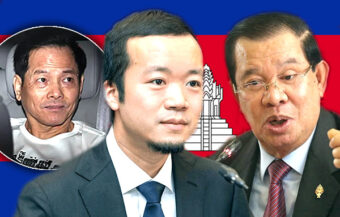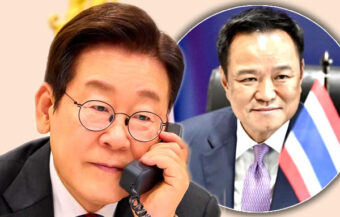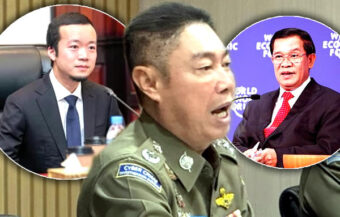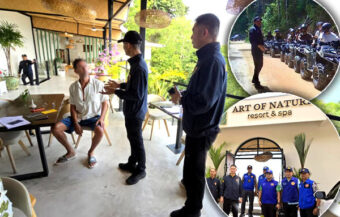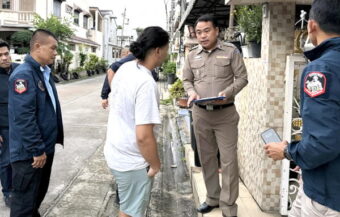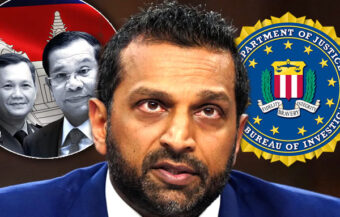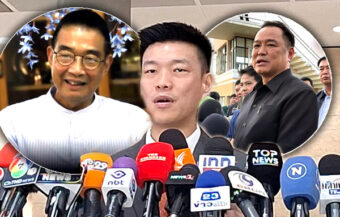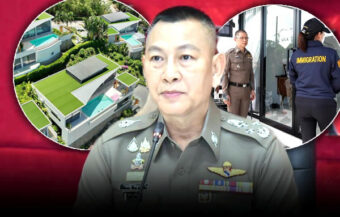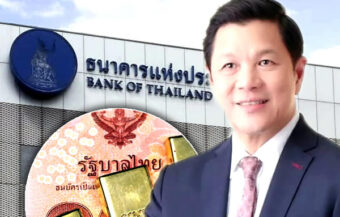Prime Minister Paetongtarn Shinawatra congratulates Trump on his election win as Thailand faces economic and political uncertainty, with concerns over trade tariffs, the impact of his policies on the nation’s economic recovery and regional stability.
Prime Minister Paetongtarn Shinawatra or ‘Ung Ing” on Wednesday finally acknowledged former President Donald Trump as the winner of Tuesday’s historic election. At the same time, the decision of the U.S. electorate on Tuesday will have a significant impact on Thailand, whether economically or politically. It comes at a time when Thailand’s economy is still struggling from the impact of the U.S.-China trade war in 2017. Furthermore, it comes with growing tensions in the Indo-Pacific between China and Western powers. Significantly, Prime Minister Paetongtarn congratulated Trump and his Vice President-elect, J.D. Vance, after travelling to China for a summit with top ministers on Wednesday morning.
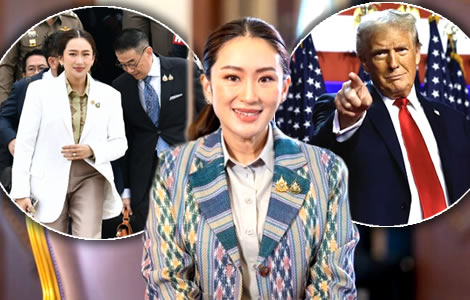
Thai Prime Minister Paetongtarn Shinawatra has congratulated Donald Trump on his victory in the 2024 U.S. presidential election.
In a public statement, she acknowledged Trump’s win. Similarly, she reaffirmed Thailand’s commitment to its partnership with the United States.
“I wish to congratulate President Donald Trump and Senator J.D. Vance on their victory in the U.S. presidential election,” she said. “I look forward to working with you to advance the long-standing Thai-U.S. alliance, benefiting our peoples and fostering prosperity in the Indo-Pacific region.”
Paetongtarn’s statement emphasises Thailand’s intention to strengthen ties with the U.S. and the wider world
This statement underlines Thailand’s intention to maintain and strengthen its relationship with the U.S. Both countries have a long history of diplomatic, economic and security cooperation. Indeed it dates back nearly two centuries.
On the same day, Paetongtarn and her delegation departed from Bangkok for Kunming, China, to attend high-level meetings.
The Prime Minister will participate in the 8th Mekong Economic Cooperation Summit and the 10th Ayeyarwady-Chao Phraya-Mekong Economic Cooperation Strategy Leaders’ Meeting.
The Greater Mekong Subregion Economic Cooperation Program (GMS) was established in 1992. It involves six Mekong countries including Cambodia, China (specifically Yunnan Province and the Guangxi Zhuang Autonomous Region), Laos, Myanmar, Thailand, and Vietnam.
These meetings aim to promote regional economic integration. Certainly, this aligns with China’s foreign policy in the region. In short, it emphasises its proximity to countries in Southeast Asia, particularly along the Mekong River.
Despite her congratulatory statement, Paetongtarn avoided further commenting on the U.S. election’s impact on Thailand. As she left for Kunming, she declined additional questions from reporters, simply smiling and waving.
Thai government waited for a clear U.S. election outcome before discussing potential policy impacts on Thailand
Thai Foreign Minister Maris Sengiampong clarified the government’s position on the U.S. election outcome. “We have to wait for clear election results before discussing any potential policy impacts,” he said. “Regardless of who leads the U.S., our relationship remains close and stable, with cooperation across multiple areas.”
Maris emphasised that Thai-U.S. relations go beyond individual administrations. He noted that bilateral ties are strong at all levels, from government-to-government (G2G) relations to partnerships in the private sector and civil society. “Our relationship is strong in every dimension, and whoever leads either nation will find a firm foundation on which to build,” he said.
Once U.S. policies become clearer under the new administration, Maris stated that Thai officials would engage in direct talks with their American counterparts. The Thai government is prepared to address any changes constructively.
Paetongtarn’s congratulatory message also highlighted the importance of the Indo-Pacific region, a key area for both Thailand and the U.S. In recent years, Thailand has strengthened alliances within the region, and the Thai government views continued cooperation with the U.S. as crucial to maintaining stability and growth.
Paetongtarn emphasised Indo-Pacific cooperation, highlighting its importance to U.S.-Thai relations
Paetongtarn’s remarks on fostering prosperity in the Indo-Pacific suggest a commitment to regional security and open economic channels. Experts believe this alignment with U.S. policy will boost trade, tourism and technological exchanges between the two nations.
Thailand’s National Economic and Social Development Board (NESDB) has been closely monitoring the U.S. election results. Its officials are assessing potential impacts on Thai exports and overall economic health. Given the volatility of global markets during election cycles, the NESDB is prepared to suggest measures that could cushion the Thai economy should international demand fluctuate.
Political instability, legal warfare and Trump undermining economic recovery efforts by government and confidence
Trump reaches out to US expats in Thailand to help win the election. No double taxation pledge
The Stock Exchange of Thailand (SET) also monitored the election closely. It views the election as a potential indicator of market trends in Thailand. The U.S. dollar has strengthened while funds are leaving developing markets.
Political analysts in Bangkok agree that the Thai-U.S. relationship is likely to remain resilient. However, some are concerned that a Trump presidency could strain U.S.-China relations further.
Thailand’s U.S. trade relationship faces challenges under Trump, raising concerns about trade tariffs and growth
The U.S.-Thai alliance has endured many political changes, with both countries prioritising shared interests, particularly in trade and security. However, Trump’s radical trade and taxation policies do not bode well for Thailand. His goal appears to be reversing foreign investment out of the U.S. while pushing a protectionist agenda.
Concerns have been raised about a proposed 10-20% global trade tariff on imports. Thailand, which recorded a $41.9 billion trade deficit with the U.S., may face pressure to purchase more U.S. goods and services. This mercantilist approach was a hallmark of Trump’s first presidency.
That administration also started the U.S.-China trade war, which caused Thailand’s growth to falter in 2017. Since then, the country has struggled to recover.
Despite these challenges, many Thai policymakers view the relationship as mutually beneficial. They see the U.S. as a critical partner in promoting regional stability, serving as a vital counterbalance to an increasingly aggressive China.
Foreign Minister Maris stresses Thailand-U.S. relationship beyond government policies, including private sector and citizens
On Wednesday, Foreign Minister Maris Sengiampong echoed this sentiment. He stated that the partnership between Thailand and the U.S. goes beyond government policies. He described it as encompassing both countries’ private sectors and the citizens of both nations. For example, Thailand is home to about 100,000 U.S. expatriates.
Trump performed surprisingly well in overseas ballots this year. This may be linked to his campaign promise to scrap double taxation for U.S. citizens living abroad. His proposed plan also envisions the eventual elimination of all U.S. income tax.
Foreign Minister Maris emphasised that any policy shifts under a Trump administration would be discussed through diplomatic channels. It is also noted that former Prime Minister Thaksin Shinawatra is a longstanding friend of Mr. Trump.
“Our leaders and various sectors work together on multiple fronts,” Maris said. “The Prime Minister is committed to ensuring that Thailand’s international relations remain strong, fair, and beneficial to all involved.”
Join the Thai News forum, follow Thai Examiner on Facebook here
Receive all our stories as they come out on Telegram here
Follow Thai Examiner here
Further reading:
Paetongtarn’s government set to tackle the evil of chronic debt in Thailand as the tide still rises
Srettha’s crisis is not just an economic one, it is a ‘3D debt crisis’ that is strangling GDP growth
Zombie Thai firms holding back economic growth as they struggle just to pay interest on bank debt
Incoherent government economic policy clashes with Bank of Thailand’s efforts to rein in debt
Economy is in troubled waters with fears for both exports and foreign tourism as 2023 winds down
Thailand faces an economic future of low growth despite Srettha’s plans because of a darker world
Another dip for the baht or are economic danger signals flashing for both Thailand and the world?
Police chief confirms 2 dead with reports of at least one more fatality in Bangkok mass shooting
Bank of Thailand boss appears critical of the new government’s policy initiatives on the economy
Concerns over household debt rising as banks report marginally lower non-performing loans

